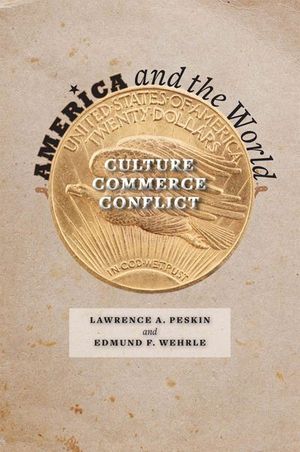America and the World
Edmund F Wehrle Follow this author
Follow this author
Published by Johns Hopkins University Press
This American history explores the country’s role as a globalizing force from the arrival of Columbus to the 21st century.
The twenty-first century may be the age of globalization, but America has been at the cutting edge of globalization since Columbus landed here five centuries ago. In America and the World, Lawrence A. Peskin and Edmund F. Wehrle explore America's evolving connections with Europe, Africa, and Asia in the three areas that historically have been indicators of global interaction: trade and industry, diplomacy and war, and the "soft" power of ideas and culture.
Divided into four historical phases of globalization, this book considers how international events and trends influenced American as well as how America exerted its own influence—whether economic, cultural, or military—on the world. The authors demonstrate how technology and disease enabled Europeans to subjugate the New World, how colonial American products transformed Europe and Africa, and how post-revolutionary American ideas helped foment revolutions in Europe and elsewhere.
Peskin and Wehrle also explore America’s rise to global superpower, and how this power alienated people around the world and bred dissent at home. During the civil rights movement, America borrowed much from the world as it addressed the social issues of the day. At the same time, Americans—especially African Americans—offered a global model for change as the country grappled with racial and gender inequality.
The twenty-first century may be the age of globalization, but America has been at the cutting edge of globalization since Columbus landed here five centuries ago. In America and the World, Lawrence A. Peskin and Edmund F. Wehrle explore America's evolving connections with Europe, Africa, and Asia in the three areas that historically have been indicators of global interaction: trade and industry, diplomacy and war, and the "soft" power of ideas and culture.
Divided into four historical phases of globalization, this book considers how international events and trends influenced American as well as how America exerted its own influence—whether economic, cultural, or military—on the world. The authors demonstrate how technology and disease enabled Europeans to subjugate the New World, how colonial American products transformed Europe and Africa, and how post-revolutionary American ideas helped foment revolutions in Europe and elsewhere.
Peskin and Wehrle also explore America’s rise to global superpower, and how this power alienated people around the world and bred dissent at home. During the civil rights movement, America borrowed much from the world as it addressed the social issues of the day. At the same time, Americans—especially African Americans—offered a global model for change as the country grappled with racial and gender inequality.
BUY NOW FROM
COMMUNITY REVIEWS

